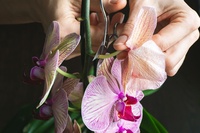Pruning houseplants boosts growth and beauty. Learn the art of precise trimming for flourishing indoor greenery.
Indoor plants bring vitality and tranquility to our living spaces, creating a soothing connection with nature. To maintain their health and aesthetics, regular care is essential, and one crucial aspect is pruning. It might seem intimidating, but pruning is an artful practice that involves selectively trimming leaves, stems, and branches to promote growth, control size, and enhance the overall appearance of your houseplants. With a bit of knowledge and the right tools, you can master the technique of pruning, fostering lush and vibrant indoor greenery that not only rejuvenates your home but also uplifts your mood.
The importance of pruning houseplants
Pruning is more than just removing excess growth; it's about stimulating new growth in a controlled manner. Over time, indoor plants can become leggy, with sparse foliage and elongated stems. Pruning helps rectify this by encouraging branching and new shoots, leading to fuller and more compact growth. Additionally, removing dead or yellowing leaves not only improves the plant’s appearance but also prevents the spread of diseases and pests.
Tools and techniques
Equipping yourself with the right tools is vital for successfully pruning houseplants. Sharp, clean pruning shears or scissors are essential to make clean cuts, reducing the risk of damaging the plant. Before you begin, familiarize yourself with the specific needs of your plant species because different plants may require different approaches. Regularly pinch back the tips of growing stems to promote branching and a bushier appearance. When cutting, make clean cuts just above a leaf node to encourage new growth in the desired direction.
The best time to prune houseplants
Knowing when to prune is as important as knowing how to prune. The best time for pruning varies depending on the plant type. For most houseplants, spring and early summer are ideal as they enter their active growth phase. However, some plants might benefit from pruning in the fall or winter. Also, consider the frequency of pruning—some plants require regular pinching, while others might need less frequent intervention. Observing the plant’s growth patterns and adjusting your pruning schedule accordingly will help achieve the best results.
Addressing common concerns
Pruning can evoke worries about harming the plant. However, with a thoughtful approach, you can alleviate these concerns. Remember that plants are resilient and designed to withstand some level of pruning. Start with minimal trimming and gradually increase as you gain confidence. If you are unsure, seek guidance from gardening resources or local nurseries. While it is essential to prune, it is equally crucial not to go overboard. Over-pruning can stress the plant and impede its growth. By following best practices and monitoring the plant’s response, you will strike a balance between maintaining its health and enhancing its beauty.
Pruning houseplants is a rewarding endeavor that empowers you to shape your indoor garden’s aesthetics and health. With patience and a deep understanding of your plants’ needs, you can master the art of pruning. As you observe the renewed vigor, lush foliage, and compact growth resulting from your efforts, you will develop a stronger connection with your green companions. So, embrace the pruning shears and embark on a journey to create a haven of flourishing and beautiful houseplants within the confines of your home.




